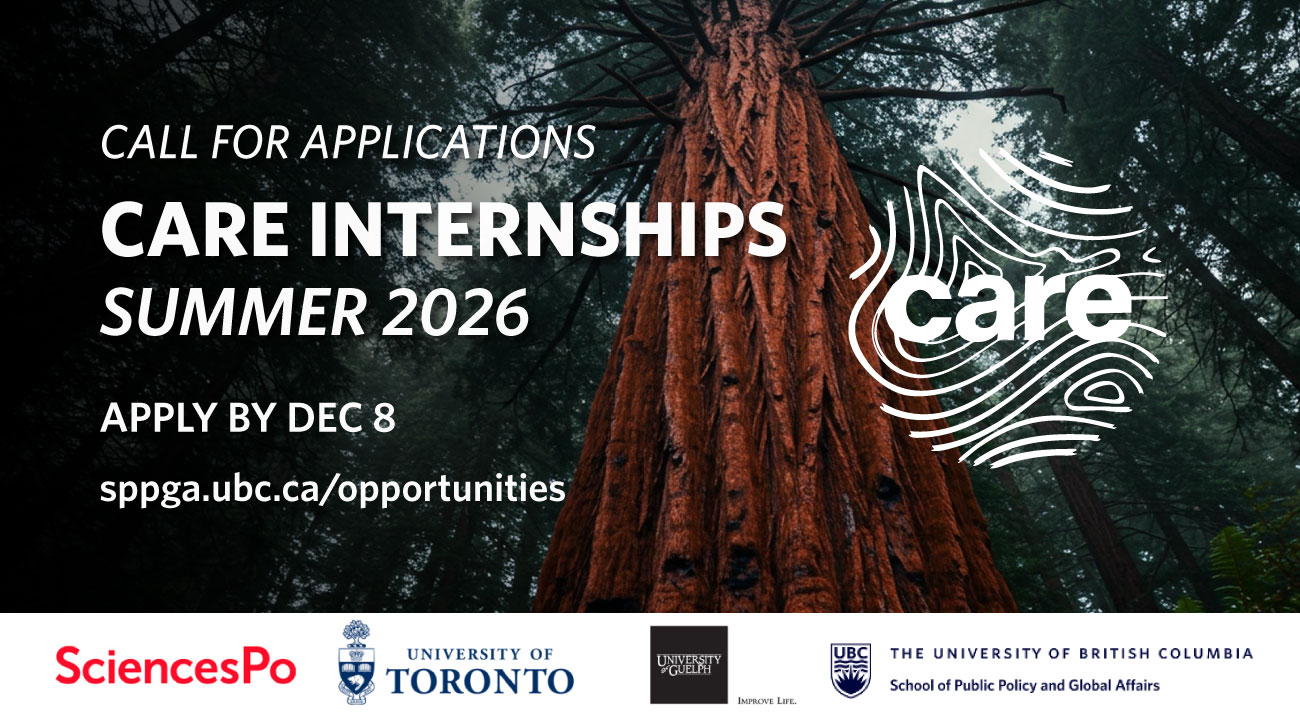
Master of Public Policy and Global Affairs (MPPGA) alumni are responding to the COVID-19 situation with policies, recommendations, and actions in professional roles that span the public and private sectors, and non-governmental agencies.
We heard from twelve MPPGA alumni about what their current policy work entails and how is it impacting their organization and key stakeholders, both in Canada and across the world. They also illustrated how the MPPGA program prepared them with the skills, perspectives, and knowledge they needed to address a rapidly changing situation. Each of them is working towards positive change, to meet an unprecedented health crisis that has growing impacts on society and the global economy.
During the current COVID-19 crisis, our team is analyzing how energy efficiency actions can be incorporated in economic stimulus programs to support workers and drive the clean energy transition. – Kiran Alwani, Policy Analyst, Natural Resources Canada
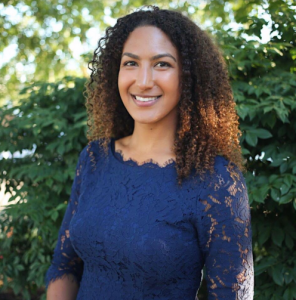

Photo Caption: MPPGA alumna Adrianna Spyker
Currently I am working for the Fraser Health Authority within Population and Public Health as a Community Health Specialist. In my role, I conduct research, analyze and apply data to prepare reports, and provide presentations on practice and evidence to inform local government and the Health Authority on community health initiatives. Recent topics I have worked on from a public health lens include food security, vaping, vulnerable and housing insecure populations, settlement and newcomer engagement, mental health and addictions.
Currently, my role has be focused on COVID-19 response. During this time, there are many questions and uncertainties. As a liaison for the Health Authority, I collaborate and engage with municipalities and community organizations in their response and planning for COVID-19 as the Health Authority representative. I work with multiple-stakeholders, which include top decision-makers and community organizations, by providing information and support for decision-making and operation in addition to identifying and connecting missing-links or gaps.
This is a very unique time and this is a challenging and dynamic role in which flexibility, coordination, strong and effective communication, as well as critical policy and data analysis are important. The MPPGA program prepared me with skills to confidently assert myself in this position.
The seriousness of COVID-19 reinforces the need for effective and meaningful engagement with strategic and informed decision-making. I appreciate the MPPGA program’s emphasis on policy strategy, processes and collaboration. The implementation and functions within the policy cycle are complex and challenging however, if individuals can understand not only each step of a policy process but have the skills for research, engagement and collaboration it will assist in a more effective outcome or process. The skills techniques taught directly or learned indirectly throughout the MPPGA program are valuable and have prepared me for professional policy work.
Each day, there are new developments of issues or challenges. The diverse learning experience of the MPPGA program has helped me navigate through my role so that I have be able to provide meaningful contributions to our communities’ response to COVID-19.
I work as an Advisor in the Intergovernmental Relations Secretariat (IGRS) of the BC Government. IGRS is a small central agency that sits within the Office of the Premier. As such, the majority of the organisation’s work is to inform decisions made by the Premier on intergovernmental relations matters. IGRS also supports the role of the Minister responsible for the Consular Corps, Minister Ralston.
There are many interesting issues that IGRS is involved with during the COVID-19 pandemic. Some of the work IGRS is doing is to provide advice to the Premier and other high-level government decision-makers on engaging with federal, provincial and international governments. Other aspects of IGRS’ work is to undertake research and track trends across other jurisdictions – within Canada or internationally – which inform the strategies and response of the BC government to (non-health related) aspects of the pandemic. This may include, for example, tracking economic impacts or researching the policy responses of other governments.
I have utilised a number of skills learnt in the MPPGA program during this time. It has been useful to have had exposure to other government systems, for instance. This has helped me to become more familiar with the way governments implement their policies and to understand the impact this has on citizens. It has also been useful to have strong skills in writing briefing notes and providing policy advice, because as decision makers in the government need to make quick decisions during this time, and on extremely complex issues, it is useful to have a framework for communication that ensures my advice is concise and meaningful.
Given that my role supports the provincial economy respond to setbacks, COVID-19 is naturally a major focus for me. I am working daily to coordinate inter-agency calls to determine how programs are being rolled out to support the economy, and to identify gaps or challenges across sectors and regions, and then develop responses to the perceived issues.
My colleagues and I are working hard to ensure that programs and policies holistically address the unique challenges that rural economies face, such as agriculture, forest silviculture and harvesting, tourism, lack of connectivity infrastructure, lack of access to mental health resources, sector concentration, and the cumulative impacts in many regions of severe wildfire/flood seasons and the downturn in forestry. I am also working closely with other ministries to provide on-the-ground information to incorporate into the development of economic recovery policy frameworks for the province.
Responding to COVID-19 has been an "all hands on deck" experience for the provincial government (from our respective makeshift home offices), but it has been an exciting time to see creative approaches to policy development implemented with efficiency. This has allowed new perspectives and approaches to be incorporated, utilizing skills that I learned during my MPPGA degree on assessments of policy decisions and applying proper feedback mechanisms in order to understand the impact. This is particularly clear for me when translating policies designed for urban economies to the realities of rural British Columbia, and working to ensure that all communities are having their needs addressed and supported during this uncertain time.
In the context of the Canadian Government’s response to the COVID-19 emergency, the Department of National Defence (DND) and Canadian Armed forces (CAF), the Defence Team, plays a key supportive role for other Government Departments and Provincial and Territorial authorities in their efforts to delay, contain, mitigate and recover from the impacts of this crisis.
In this context, as a policy officer in the Policy Group (ADM Pol) at DND, I contribute to providing policy advice to the Minister of National Defence and other senior defence officials to support the Defence Team’s efforts as part of the Whole-of-Government response to COVID-19. Fulfilling this role entails drafting briefing material and providing advice to leadership on how the CAF may assist civilian authorities in their response to this emergency. Continued communication and coordination with other members of my team as well as colleagues in the CAF and other Government Departments is an essential requirement for performing my duties.
In doing my job, I draw heavily from the knowledge and skills I acquired in the MPPGA program, particularly my exposure to policy considerations and communication intricacies in the context of my Global Policy Project working with the BC Ministry of Energy, Mines and Petroleum Resources.
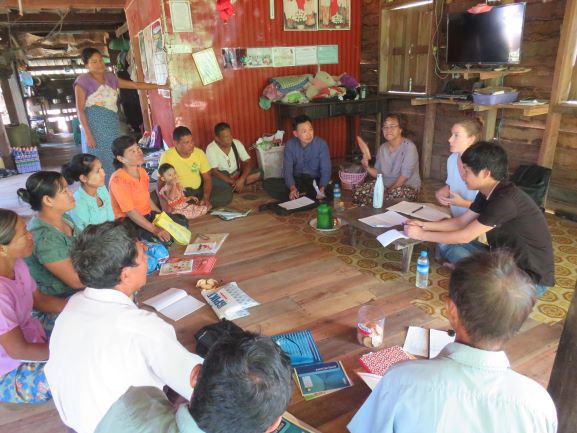

Photo Caption: Interview with RWCP farmers who have formed a cooperative to combine their resources for group savings and lending, agro-input purchasing and crop selling, Taungup Township, Rakhine State (September 2019)
I am working as Project Manager for the Rakhine Winter Crops Project (RWCP) located in Rakhine State, Myanmar. RWCP is a five year programme funded by New Zealand to support the adoption of Good Agricultural Practices (GAP), thereby increasing food security and reducing poverty, among small-scale and commercial farmers in Rakhine State, one of Myanmar's poorest and conflict-affected areas.
With nearly 50 staff delivering project activities to just under 7,000 beneficiaries in a context of limited access to health care and spotty communications, and in a country with a long and porous border with China, I was aware from the outset just how exposed Myanmar and RWCP are to this virus. Access to timely and accurate information is always a challenge here, and was compounded by the Myanmar government's assertion that there were zero cases of COVID-19 in the country until 23rd March - a claim which was broadly found dubious given Myanmar's proximity to and deep economic interaction with China as well as the rapid spread of the virus around the world.
To guide a clear and coherent response to this rapidly changing situation, I specified two scenarios based on the severity of the outbreak in Myanmar (based both official and unofficial information channels) and the programmatic responses that each scenario would elicit. At the same time, I collected and disseminated to project staff the most up to date and trusted information related to the global spread of the virus and effective prevention measures (i.e. social distancing, personal hygiene and sanitization). Battling "fake news" is a challenge everywhere, but especially so in Myanmar where Facebook essentially is the Internet, and has notoriously been used to spread hate speech and disinformation. In this respect, the direct avenues of communication between senior management and all staff members, including everyone from managers to cleaners, fostered throughout the project's duration, were critical to aligning organisational policies with the anxieties and experiences of those on the ground.
As a result of this proactive planning and ongoing, open discussions between all stakeholders, RWCP's work from home policy had already been implemented by the time Myanmar started locking down and travel restrictions were put in place. We have now pivoted our efforts towards activities that can be conducted remotely and are working to support project beneficiaries as best we can while still protecting everyone's health and safety.
This systematic approach to ideation in complex and dynamic environments was something I practiced throughout my time in the MPPGA program with the support of the many intelligent, creative and supportive professors and fellow students whom I worked alongside. With this foundation in place, I was well-prepared to apply these lessons in a totally new set of conditions.
Although I now sit behind a desk back in Vancouver, I look forward to returning to southern Rakhine as soon as I can and seeing out the end of RWCP later this year. Wishing all my former classmates, current and past students, professors, staff, everyone in between at MPPGA the very best from the bottom of my heart.
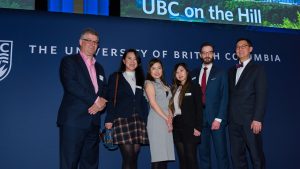

Photo Caption: UBC on the Hill event with UBC President Santa Ono and Women in House participants and staff from SPPGA. Photo Credit: Richard Lawrence Photography
Canada's energy sector is facing significant challenges as the oil prices are declining steeply and containment measures for COVID-19 are significantly reducing demand. Canada's energy sector accounts for over 10% of nominal GDP, directly employs over 282,000 people and indirectly supports over 550,000 jobs. Natural Resources Canada has played an instrumental role in shaping the $2 billion economic response package that was announced on Friday, April 17, 2020, to support Canadian workers in the energy sector. The package includes allocating $750 million in new funding over two years to create a new repayable loan program to work with oil and gas companies to reduce their greenhouse gas emissions, which was led my sector - the Strategic Petroleum Policy and Investment Office.
As a policy analyst, I have been monitoring and assessing global market trends in the energy sector and provided sub-sector briefs and analyses to recommend a targeted approach that supports the challenging economic circumstances facing the sector, while staying consistent with our national climate plans and emission reduction goals. Protecting the environment and growing the economy have to go hand-in-hand. The methane emissions reduction program for the oil and gas sector will help keep workers employed, assist firms in making capital investments necessary to reduce greenhouse gas emissions and support Canada's transition to a low carbon future.
The MPPGA program has prepared me well for my current role. In particular, my Global Policy Project on reconciling industry development ambitions with meeting climate targets enabled me to gain a better understanding of the complex challenges the energy sector faces as we shift towards a global low carbon economy. My macroeconomics and microeconomic courses, in particular, have provided fundamental theoretical knowledge for me to begin tackling these policy questions. I continue to follow all of my MPPGA professors and SPPGA faculty members on Twitter for their insights and perspectives to gain a more balanced perspective on these complex policy issues.
I’m a Policy Analyst for Indigenous Programs and Government Relations with Woodfibre LNG. The entire Woodfibre team has been working from home since the beginning of March due to the COVID-19 pandemic.
As the virus’ spread accelerated, I helped develop the triggers that set in motion the company’s business continuity plan. Since working from home, I’ve been given the additional responsibility of sending updates to the Woodfibre team, and its parent company in Singapore, on how the pandemic is playing out across North America. I keep an especially close eye on B.C., Alberta, and Texas, where the company has business units based. These updates include case numbers, deaths, and recoveries, but also help keep the team informed of critical news stories and policy developments, especially related to the energy industry, which are easily lost in the crowded coverage of COVID-19.
It’s easy to suffer from COVID-19 information overload right now, but knowing where and how to find reliable and relevant information, summarize it, and turn it into a usable product for the entire company is where the MPPGA program really helped hone my skills as a policy analyst.
In my position as an analyst at the Treasury Board Secretariat, I’m not working on any new policies, but rather adjusting to different and rapidly evolving processes for government departments to access their funds and acquire the necessary authorities to implement their responses to COVID-19. We’re all trying to ensure that essential government projects and services can proceed with as little delay as possible. This means finding flexibility where possible while maintaining sound management and appropriate authorization processes.
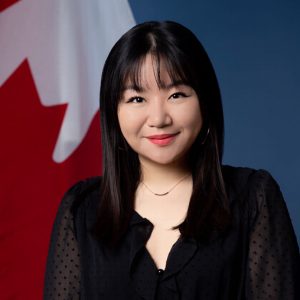

Photo Caption: MPPGA alumna Simin Yook at Global Affairs Canada
During the COVID-19 crisis, I have taken some time at night and during the weekends to volunteer at the Emergency Response Watch Centre (ERWC) within Global Affairs Canada to repatriate stranded Canadians across the world after all Canadian borders have shut down. The ERWC, open 24/7 has the objective to assist Canadian citizens in need of emergency consular assistance and due to the COVID-19 pandemic, it required enormous amount of help, as the centre was receiving thousands of calls and emails per day. Hundreds of volunteers and staff, including myself were answering phone calls and emails from Canadians trying to return home. Specifically, my role consisted of assisting Canadians abroad to get on the commercially assisted flights and helping those who needed an emergency loan, a temporary financial assistance program created by the Government of Canada to help Canadian outside Canada return home.
This role required skills to work under high pressure and the ability to make the right judgement in a fast paced environment but also required a sympathetic heart to understand the situation of each stranded Canadian. After all, volunteering at the ERWC was worthwhile as it was heartwarming to see Canadian safely returning to Canada and I really hope with all my heart that those still stranded abroad can make it home safe and sound.
Currently, I work as a Policy Analyst with the International and Domestic Engagement team at Natural Resources Canada’s Office of Energy Efficiency. In this role, I work to advance international projects and global partnerships related to energy efficiency. During the current COVID-19 crisis, our team is analyzing how energy efficiency actions can be incorporated in economic stimulus programs to support workers and drive the clean energy transition. In particular, I have been looking at how various countries across the world are responding to the ongoing crisis, and what lessons we can learn from responses to the previous economic crisis.
I believe the MPPGA program was instrumental in helping me develop the key skills needed to excel as a policy professional – strong policy research and analysis skills, writing and communication skills, as well as the ability to collaborate with diverse stakeholders and work successfully in a team. I’m also grateful to have had the opportunity to engage with and learn from exceptional professors and peers.
At Nordicity, we help governments develop better policy and deliver better services, companies grow through smart investments, and all our clients make informed, evidence-based decisions. As we continue to do so as a fully remote team across Canada and the UK, we have pivoted towards supporting our clients through assessing and responding to both short- and long-term impacts of the pandemic at both the industry and organizational level.
Many of our assignments involve consultation through facilitated sessions, town hall meetings, interviews, and online surveys. In replacing in-person communications, we have been leveraging online collaboration tools (where appropriate) that maintain project momentum, community engagement, and promote collective planning and idea seeding.
We have also been supporting industry associations and government agencies in their efforts to gather data on the impacts of COVID-19 across important sectors in Canada, through our design and development of sector-wide impact surveys.
Our response looks different across the firm’s core sectors. For example, our work with the arts and culture sector is involving advocacy efforts to encourage leaders to recognise the demonstrable value of the arts during this period, including their non-economic role in social welfare, and the need for them to be an integral part of any relief strategy. It is our hope that these considerations act as a catalyst not just for economic recovery, but also for the mental health and all those affected.
I’ve taken many lessons learned from the MPPGA program and applied them to my professional role, and these lessons are proving invaluable in the wake of unprecedented circumstances. The program’s focus on real-life challenges in an ever-changing policy landscape have given me confidence to address new challenges through developing creative solutions.
Of course, core understandings of economic policy, as well as policy evaluation have been key to my understandings of good governance, the need for multilateral cooperation and resilience of international organizations. Most relevant to my work currently is my understanding of stakeholder relations and public engagement, which is of great importance to better understand what is required for recovery.
I am fortunate to work alongside another MPPGA alumnus, Chad Rickaby, which has garnered fruitful conversation about innovative solutions to our client’s policy and business-related issues as they navigate this uncertain time.


Photo Caption: MPPGA alumnus Nicholas Lloyd-Kuzik
The Centre for Rural Health Research (CRHR) at the University of British Columbia exists primarily to research rural health issues identified by our community partners across the province and to work to have these community insights reflected in BC's health policy.
Over the past month or so, the staff at the CRHR have been reflecting on the ways we might be able to support and empower rural and remote communities as they face the challenges of dealing with COVID-19.
One of our ideas is to develop a podcast series which will highlight rural innovations and responses to COVID-19. Each episode will feature interviews with rural community members (or organizations working in rural areas) to discuss innovative ways they’ve worked to address issues in their own communities. We hope that sharing these stories may help other communities address their own challenges and serve as a source of hope and positivity in the midst of widespread uncertainty and anxiety.
We have also launched a BC-wide patient survey to gather people's experiences in dealing with COVID-19 in their communities. The survey findings will be shared with rural communities to support learning and collaboration across communities, and will also be shared with decision-makers (MOH, Health Authorities) to inform rural health care policy more broadly.
I cut my podcast teeth with the MPPGA student association podcast! My involvement with the podcast group is a significant part of why the centre was interested in bringing me on (in addition to health and policy experience of course) - to help with knowledge translation and reaching new audiences by sharing information in a different way.
I’ve found myself mentally drawing from the quantitative methods course, behavioural foundation of public policy, public management, global policy process, policy communications - really almost all of the courses - in discussions around the COVID-19 response. In this role and in others I’ve held since graduating I’ve often felt that I bring a different perspective to the table with a broader policy background.

